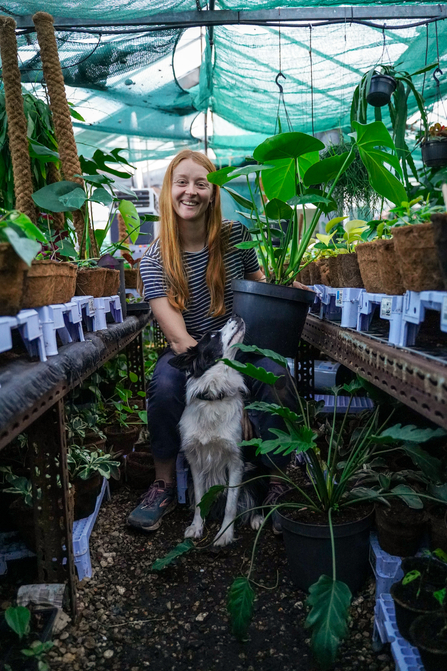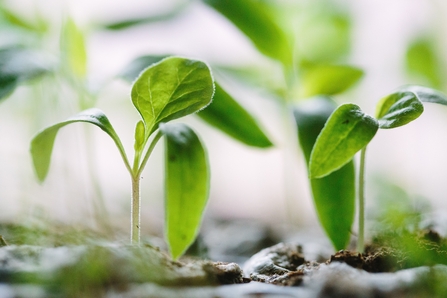Last year the Government announced that bagged peat composts will be banned from 2024, and a follow-up announcement declared a ban on commercial uses of peat in horticulture by 2026, with some exemptions until 2030.
Making peat-free plants a reality 2023
Peat-free plants at Bud Garden Centre - credit Jenny Bennion
Harriet Thompson is the founder of Harriet’s Plants, the UK’s only dedicated commercial grower of peat-free houseplants. “I absolutely welcome the proposed ban for professionals on peat free plants by 2026. I think it would be great if this could happen sooner to encourage peat bog restoration as quickly as possible.”
Brenda Smith runs Bud Garden Centre, a boutique garden centre in Burnage, Manchester. She has only ever sold peat-free bagged composts and raises all of her own plants 100 per cent peat-free. Brenda also welcomes the ban, but “will be surprised if it happens by 2026. As a small grower, I don’t have the power to implement large scale change. The massive garden centre chains could put more pressure on their growers, but currently they are simply not doing so.”
Peat-free plants and compost at Bud Garden Centre - credit Jenny Bennion
Margaret and Mike Dickinson are traditional market gardeners running Lyndene Nursery in Tarleton growing tomatoes and cut flowers. As a small, independent grower, Margaret also finds that they simply don’t have the weight of larger growers. “Peat-free is the ethical choice and it's what we want to do. However, we have yet to find a peat free seed and modular compost that delivers the consistent results we need.”
“We have found local suppliers are reluctant to order any quantity less than a full pallet. This is a big risk if the product doesn't deliver, commercial peat-free producers and wholesalers need to work together to offer smaller quantities for growers to try.”
Back in 2011 the Government introduced a voluntary target to phase out the use of peat in horticulture by 2020. However, this came and went with very little change from the horticultural industry, apart from those growers who had always believed in being peat-free. The Government then launched a consultation on banning the retail sales of peat, which was met with a resounding 95 per cent approval. The bagged peat compost ban was then set for 2024, with the professional ban following in 2026. However, some growers are arguing that there isn’t enough time to transition to peat-free, even with the stated exemptions.
These include plug plants, the small plants which are often grown abroad and exported to be grown-on in UK nurseries. Brenda Smith is “interested to see how the Dutch growers who export into the UK will adapt” if these must be peat-free even by 2030. “Peat-free can be hard to transition to, if you’ve got something that you’ve been doing for a long time down to a fine art, why would you want to change? But in this instance there’s too much at stake – the environment.”

Harriet Thompson grows and sells peat-free houseplants at Harriets Plants - credit Harriet Thompson
Harriet Thompson continues, “With plug plants being exempt from the ban this causes the industry to be able to greenwash customers further. Yes, customers buying these plants that have been grown on in peat-free compost will absolutely be buying better and supporting the use of less peat, but can we call a plant peat free if the plug it has been started in is grown using peat?”
Some of the details of the exemptions from the 2026 ban remain unclear. Mushrooms are certainly included in that, and so will still be back to be grown in peat until 2030, and some other food products may follow suit.
As a tomato grower, Margaret Dickinson believes that “The peat ban can only work if there's other initiatives working at the same time, supported by the producers themselves, conservation groups, local authorities, and the Government. It's a huge challenge and it needs everyone on board to make it happen, not just farmers and growers.”
However, there are lots of growers out there who are working hard towards a peat-free future. Harriet Thompson says, “I think the peat ban will mean more growers are growing peat-free and that will be amazing to see. Not just houseplants, everything. Growing peat-free from the beginning for me has been an absolute pleasure and it'll be such a great feeling to have more peat-free growers on board.”
And everyone at home can make a difference too - switch to only buying peat-free plants today. It may involve checking the label, asking staff, or searching out that particular plant online, but this is such a small price to pay to make such a huge difference to our peatlands and our planet. Please #LovePeat and go peat-free today.
You can find loads of hints and tips on going peat-free in our Peat Action Pack.


